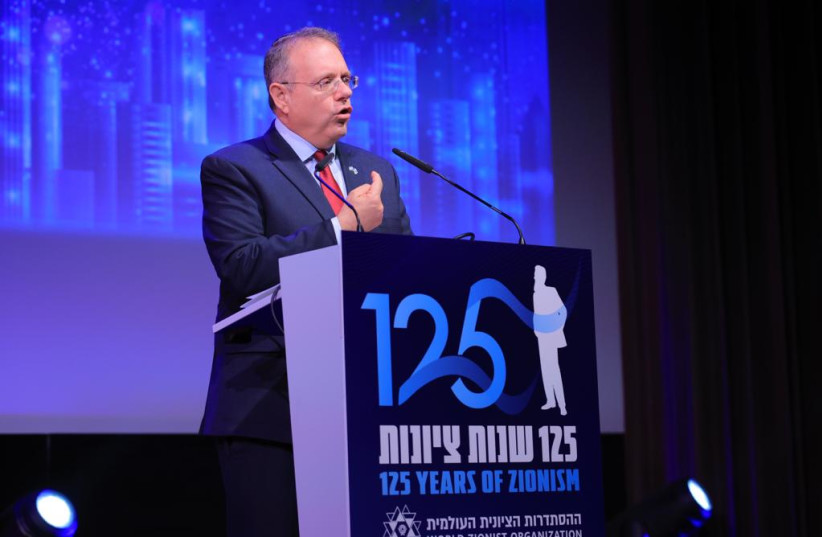Members of the World Zionist Organization Executive from across the world stood on the stage at the Three Kings Hotel in Basel, Switzerland, during the opening celebrations of the 125th anniversary of the First Zionist Congress on Monday. But certain groups were missing.
Executive members from the WZO’s haredi political factions, Eretz Hakodesh and Shas, were not among the many officials onstage who sang “Hatikvah.”
The Jerusalem Post asked them why they did not participate in the event. The only Shas member who participated was Yanki Deri, head of a WZO department and son of Shas leader Arye Deri. He participated in the event and in the gala evening. However, he did not join the executive members onstage for “Hatikvah,” presumably because a woman led the singing.
Eretz Hakodesh, an American haredi group, did not directly address the Post’s questions regarding their absence from the event. Sources in Eretz Hakodesh gave a few reasons explaining why they had their representative avoid the celebrations.
The first reason was the kashrut of the event. The participants received three meals a day during the conference. The meals were all made by a European kosher catering company, but they were not Mehadrin, a stricter version of kashrut. Sources in Eretz Hakodesh said the level of kashrut was not suitable for them.

They also said they did not feel comfortable attending a performance led by a female singer, let alone singing onstage alongside her.
Another reason they mentioned was the timing of the conference, which occurred during the last days of August, when children and families are on summer vacation. Yet, this did not stop the rest of the men and women who left their families to attend the event.
Another source within Eretz Hakodesh mentioned that they felt the event was “a waste of the organization’s money” because it had to cover flights and hotels for most of the participants.
What is the World Zionist Organization's point of view?
A source in the WZO Executive said: “The fact that the haredi members haven’t participated in the largest event our movement [has] hosted in decades, emphasizes that the haredi parties don’t really believe in Zionism but are just in it to receive funds and influence agendas regarding Judaism.”
Another senior official said: “If the kosher food was good enough for haredi participants... such as Judge [Rachel] Freier and rabbis from around the world, it should be kosher enough for the haredi members.”
Another executive member said: “If they really wanted to come, the organization would find solutions to all of their problems, yet they didn’t really want to come. Many of them were also asked by their leaders or constituents not to participate in this huge celebration of Zionism.”
The WZO declined to comment on the matter.
Close to 2,000 guests gathered in Basel this week to mark the 125th anniversary of the First Zionist Congress in a three-day event, corresponding with the same dates in 1897. The conference was organized by the WZO in cooperation with the Swiss Federation of Jewish Communities and the government of Basel Canton.
The highlight of the event was at the Stadtcasino Hall, where the First Zionist Congress took place. This is where the first 208 delegates discussed their vision for the establishment of the Jewish state.
